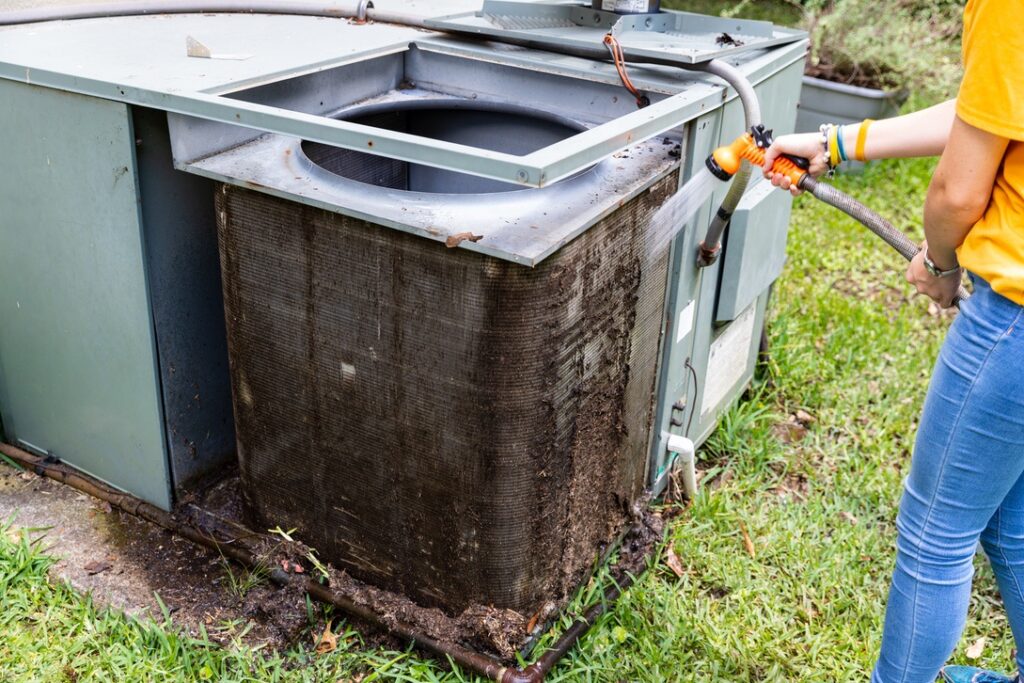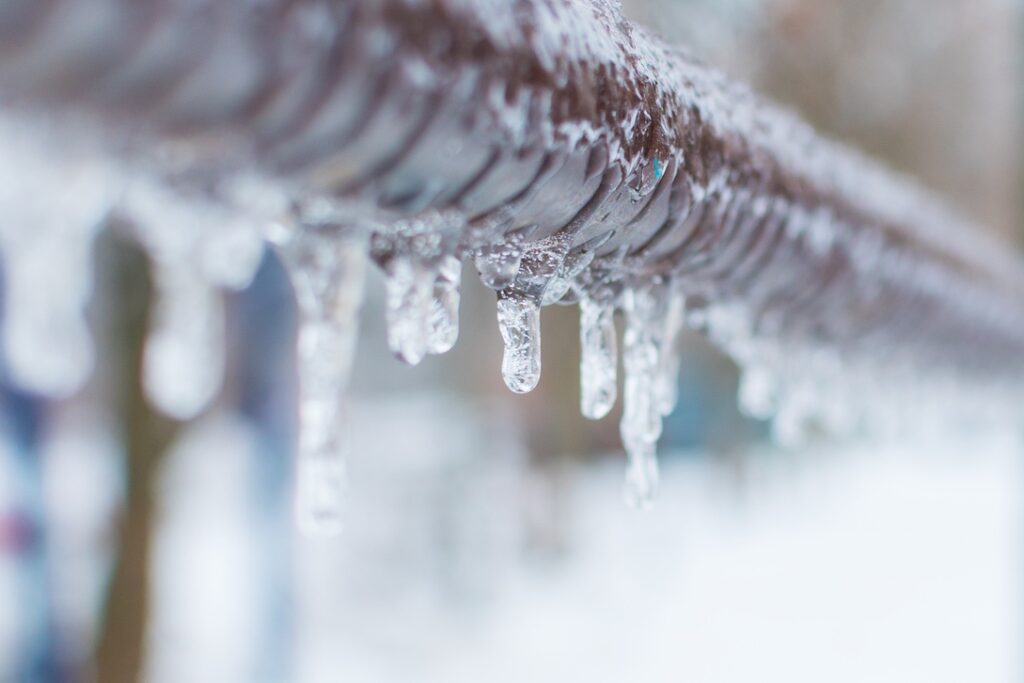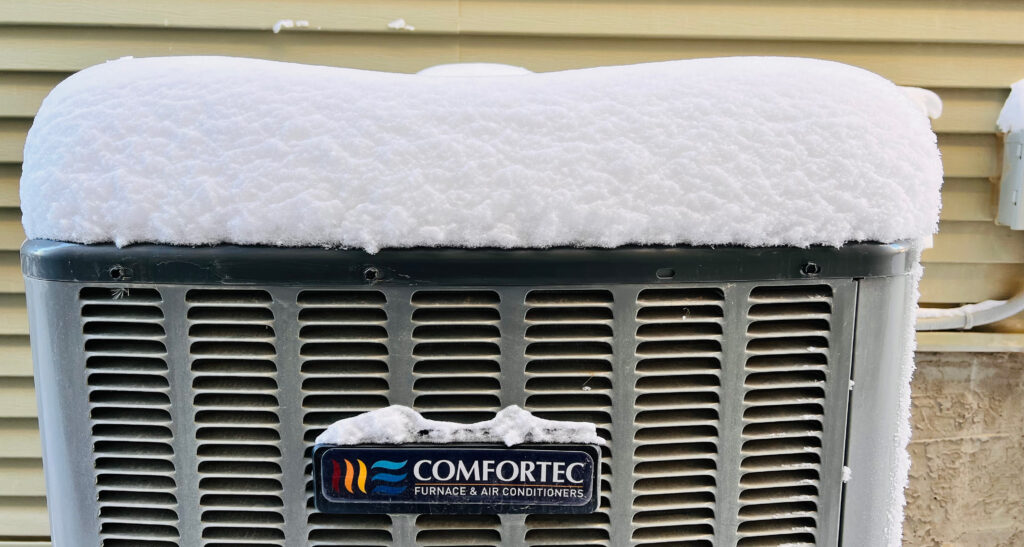Your central air conditioner’s outdoor unit goes through a lot during Alberta’s harsh winters, including below-freezing temperatures, ice buildup, and blowing snow. These conditions can severely damage your AC, so winterizing it is vital for protecting it and preventing potential rust damage. A little maintenance each fall can ensure your cooling equipment will still be in top working condition come summer—when you and your household need it most.
As professionals who have performed countless AC tune-ups in Alberta, the Action Furnace team is here to show you some easy maintenance tasks you can do each year before your AC gets buried neck-deep in snow. Follow along and learn how to prepare your central air conditioner for winter in Wild Rose Country.
4 Easy Steps to Winterizing Your Alberta AC
Follow these steps in order to prevent the vast majority of common problems central AC owners experience each winter in Alberta:
Step 1: Shut ‘Er Down
This might seem obvious, but before winter hits, make sure to turn off your air conditioner! Find the power switch for your AC—it should be under a lid on the outdoor unit—and flip it off.
This will prevent the air conditioner from turning on during warmer winter days. Since the AC will be off, water won’t be able to enter the system, where it could potentially freeze and damage components.
Also, be sure to flip the breakers for your AC to the “off” position in your electrical panel. This step ensures the AC doesn’t accidentally power up.

Step 2: Clean the Unit
Clean your air conditioning unit thoroughly before you prepare it for the winter season. Use a hose to wash away any of the following:
- Dirt
- Bird Droppings
- Insects
- Dust
- Leaves
- Small Branches
- Dead Grass
Any of these substances can decompose underneath snow or ice that accumulates on top of them during the winter, becoming gunk that affects your AC’s sensitive parts. Once you’ve washed them away, make sure to dry your unit completely before proceeding to the next steps to prevent premature ice buildup if the temperature drops early.

Step 3: Protect Exposed Pipes
Your AC doesn’t actively use water to cool your home, but it likely uses a PVC pipe to drain condensation away from your home. Water that freezes in this pipe during cold weather can cause damage, so insulating it and the other pipes on the outside of your home is vital.
To protect the exposed pipes from harsh winter temperatures, cut and fit foam pipe covers around them. Secure the foam covers with duct tape or zip ties, but be careful not to secure them too tightly as you’ll need to remove them come spring.
Step 4: Secure the Unit
Once you’ve completed these steps, take a moment to admire your handiwork—then put a cover on your outdoor AC unit and relax. Your air conditioner is now ready for the rigors of winter!
However, make sure to check the unit at least once a week to ensure the cover is still secure and tightly fastened. Brush away any debris that may accumulate, such as twigs, pinecones, snow, and ice.
FAQs About Winter AC Prep
1. Why is it important to turn off the air conditioner during winter?
Turning off your air conditioner prevents it from turning on during warmer winter days. This helps to prevent water from entering the system, which could potentially freeze and damage components.
Remember, turning off your AC means turning off the switch on the outdoor unit and cutting off power from your electrical panel. Simply setting your thermostat higher isn’t enough to stop the unit from accidentally turning on because of a chinook or programming error.
2. How often should I check my air conditioner during winter?
You should check your air conditioner’s outdoor unit at least once a week during winter. This makes it easy to ensure that the cover has not moved and that debris has not found its way underneath, where it could clog up the filter or fan blades.

3. What are the signs that my AC has been damaged by winter weather?
Your AC may have been impacted by winter weather if you notice any of the following during your checks:
- Broken or cracked casing: A harsh winter can lead to physical damage, such as cracks or breaks in the unit’s outer casing from ice or snow accumulation.
- Frozen or burst pipes: Extremely low temperatures can cause the condensate drain line to freeze or even burst, leading to potential water damage when thawing occurs.
- Ice inside the unit: If ice forms inside your AC unit due to winter weather, it may not melt completely come spring. This ice can damage the internal components.
- Fan blade damage: Snow, ice, or debris can get into the outdoor unit and damage the fan blades, which can then affect the entire system’s performance.
- Corrosion or rust: The winter elements can speed up the process of rusting or corrosion on the metal parts of your AC unit, which can lead to decreased efficiency and ultimately failure.
- Damage from rodents: Rodents looking for warmth might nest in the outdoor unit during the winter, chewing on wires, insulation, and other components.
- Cover damage: If your AC cover is damaged, ripped, or displaced due to harsh winter winds or heavy snowfall, it may indicate that the unit itself has been exposed to damaging conditions.
- Wear and tear on electrical connections: Extreme cold can sometimes cause electrical connections to contract and then expand as they warm, leading to loose connections or wear and tear that could affect your AC’s functionality.
Remember, if you notice any of these signs, it’s essential to call Action Furnace for AC repair. We’ll be able to identify any worn or broken parts and let you know what the most cost-effective way to solve the problem is.
5. What other maintenance should I consider for winter?
Consider scheduling a furnace tune-up. Regular maintenance of your heating system ensures it functions optimally during the cold months.
Remember, preventative maintenance is always better than facing costly repairs. By taking the time to prepare your air conditioner for the winter, you not only extend the lifespan of the unit but also ensure it will function efficiently in warm weather when you turn it back on again. And don’t forget, if you ever need professional help, contact Action Furnace—we’re just a phone call away.